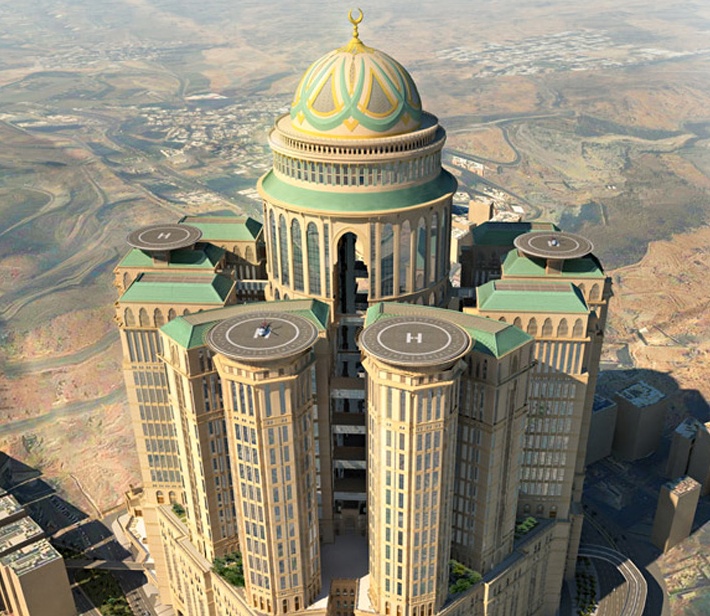Four helipads will cluster around one of the largest domes in the world, like sideplates awaiting the unveiling of a momentous main course, which will be jacked up 45 storeys into the sky above the deserts of Mecca. It is the crowning feature of the holy city's crowning glory, the superlative summit of what will be the world's largest hotel when it opens in 2017.
With 10,000 bedrooms and 70 restaurants, plus five floors for the sole use of the Saudi royal family, the L2.3bn Abraj Kudai is an entire city of five-star luxury, catering to the increasingly high expectations of well-heeled pilgrims from the Gulf.
Modelled on a "traditional desert fortress", seemingly filtered through the eyes of a Disneyland imagineer with classical pretensions, the steroidal scheme comprises 12 towers teetering on top of a 10-storey podium, which houses a bus station, shopping mall, food courts, conference centre and a lavishly appointed ballroom, "The Guardian" reported.
Located in the Manafia district, just over a mile south of the Grand Mosque, the complex is funded by the Saudi Ministry of Finance and designed by the Dar Al-Handasah group, a 7,000-strong global construction conglomerate that turns its hand to everything from designing cities in Kazakhstan to airports in Dubai. For the Abraj Kudai, it has followed the wedding-cake pastiche style of the city's recent hotel boom: cornice is piled upon cornice, with fluted pink pilasters framing blue-mirrored windows, some arched with a vaguely Ottoman air. The towers seem to be packed so closely together that guests will be able to enjoy views into each other's rooms.
"The city is turning into Mecca-hattan," says Irfan Al-Alawi, director of the UK-based Islamic Heritage Research Foundation, which campaigns to try to save what little heritage is left in Saudi Arabia's holy cities. "Everything has been swept away to make way for the incessant march of luxury hotels, which are destroying the sanctity of the place and pricing normal pilgrims out."
The Grand Mosque is now loomed over by the second tallest building in the world, the Abraj al-Bait clocktower, home to thousands more luxury hotel rooms, where rates can reach L4,000 a night for suites with the best views of the Kaaba - the black cube at the centre of the mosque around which Muslims must walk. The hotel rises 600m (2,000ft) into the air, projecting a dazzling green laser-show by night, on a site where an Ottoman fortress once stood - razed for development, along with the hill on which it sat.
The list of heritage crimes goes on, driven by state-endorsed Wahhabism, the hardline interpretation of Islam that perceives historical sites as encouraging sinful idolatry - which spawned the ideology that is now driving Isis's reign of destruction in Syria and Iraq. In Mecca and Medina, meanwhile, anything that relates to the prophet could be in the bulldozer's sights. The house of Khadijah, his first wife, was crushed to make way for public lavatories; the house of his companion Abu Bakr is now the site of a Hilton hotel; his grandson's house was flattened by the king's palace. Moments from these sites now stands a Paris Hilton store and a gender-segregated Starbucks.
"These are the last days of Mecca," says Alawi. "The pilgrimage is supposed to be a spartan, simple rite of passage, but it has turned into an experience closer to Las Vegas, which most pilgrims simply can't afford."
